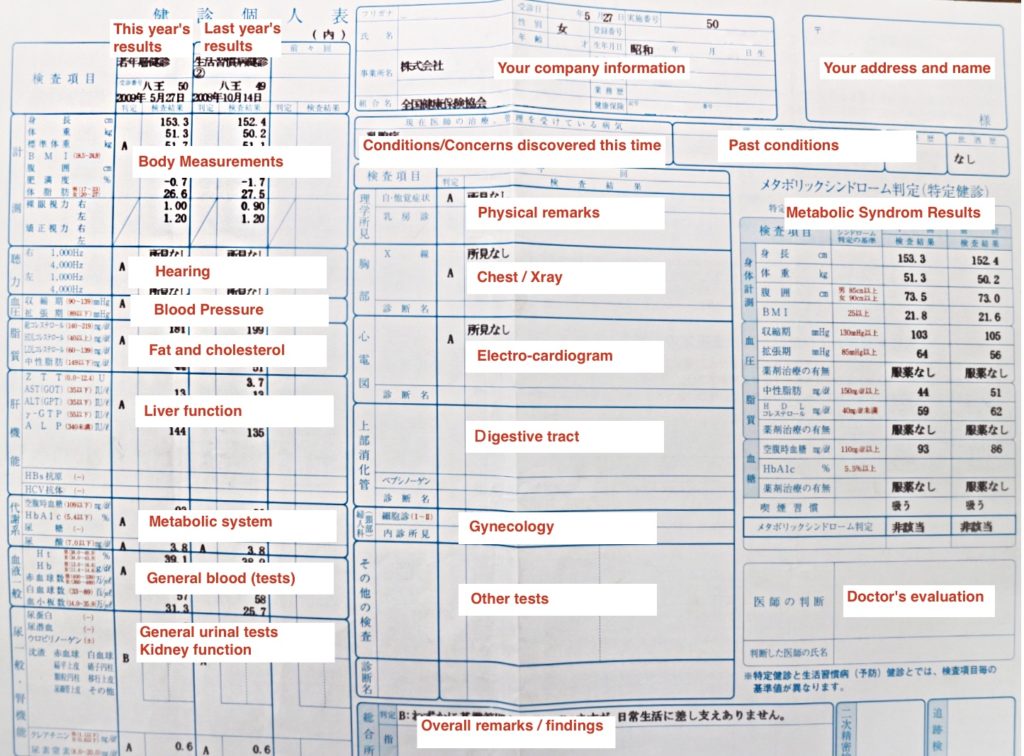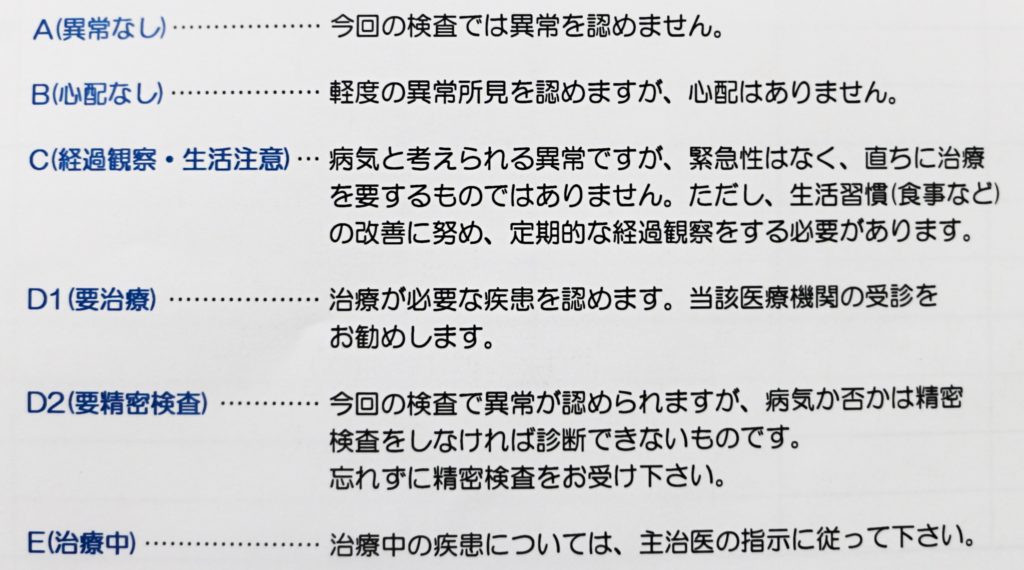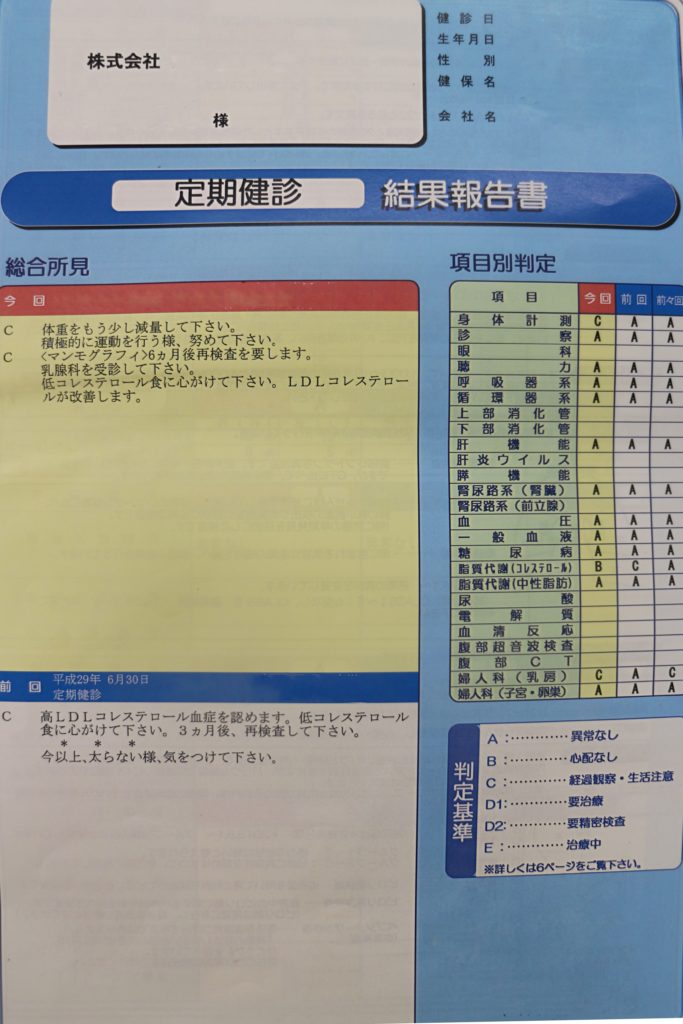How To Read And Understand Your Japanese Health Check Report
Don't stress out if you don't make straight 'A's on your kenko shindan
Ease your fears by working out what your results really mean.
If you’ve lived in Japan for a while now, in one way or another you have most likely come across the annual health check, or 健康診断 (kenkou shindan), the once-a-year reality check that — despite often being the bearer of bad news — makes things a tad more complicated by having way too many kanji. Typically organized by your company, Japan’s health check practice is a brilliant system in place, making sure that all employees are being regularly advised not to put on extra weight, smoke and drink less, and consume more vegetables in addition to, of course, exercise regularly and have less stress.
For the lucky few usually working in foreign companies, the report will include at least a brief English translation. For the rest of us, however, we can feel our blood pressure rise as we wonder what those little lines of kanji comments are trying to tell us about the health of our hearts and lungs. To help you navigate your health check results without the need to reveal your darkest secrets to your Japanese colleagues while desperately trying to figure out what that C or D on your report means, here is a guide to some of the key phrases you will find in every health check report in Japan.
Your health report at a glance
While every clinic has its own template, the following is one example of a typical health check report. If you do the health check at the same clinic every year, your report will also include results from previous years next to your current results, so that you can clearly see how much weight you’ve gained (or lost) and how your health looks like altogether in comparison to a year ago.

The results in details
The following are terms you will find in the general categories on your report.
- 定期検診結果報告書 (teiki kenshin kekka houkokusho) Health check results report
This is the title that will be at the top of the page. There are many varieties to this, but they all mean the same thing.
- 総合判定 or 総合所見 (sougou hantei or sougou shoken) Comprehensive judgment
As well as numerical data and kanji comments, your result sheet will likely include a grading system. Most likely those will be expressed in alphabet letters (and sometimes in numbers), typically covering six levels, from A to F (or E).

What those letters mean is:
A: 異常なし(ijou nashi) No abnormality.
Good news! You’re in great shape.
B: 心配なし (shinpai nashi) No need to worry as of present.
This level may also be described as 軽度異常, keido ijou, a slight abnormality, but that mild variation from the average is no problem for daily life.
C: (要)経過観察 ((you) keika kansatsu) Observe how condition progresses.
This means that there is a slight problem, but it’s typically not a pressing issue, so stay calm and see how it’s developing. Check results in this level against your previous, and consequent, health check results to see if this condition is persisting. This may be just a one-off, unusual test reading, but could also be a good opportunity to review daily habits like eating, drinking, smoking and exercise. Other variations of this level include 生活注意 (seikatsu chuui, a call for lifestyle improvement).
D: (or D1): 要受診 or 要治療 (you jushin or you chiryou) Medical consultation (or treatment) required.
Make an appointment to discuss this issue with a specialist in the field if you got this result.
E: (or D2) 要精密検査 (you seimitsu kensa) Precise examination required.
Go to see a doctor right away. A very detailed testing is required in the area where you got this result.
F: 治療中 (chiryouchuu) Currently being treated.
This means that the doctors are already aware of your condition and that you are currently being treated for it.

This section will also include general comments based on your test results, advising you what to do and not do. While those vary from person to person, below are some typical comments that, as it turns out, affect most people in the modern world.
- 今以上、太らない様、気をつけてください。(ima ijou futoranai yo, kiwotsukete kudasai) Don’t gain more weight.
- ○ヶ月後再検査を要します。(○ka getsu go saikensa wo youshimasu.) Please see a doctor for this condition again in the next ( ) months.
- 高LDLコレステロール血症を認めます。(kou LDL koresuteroru ketsusho wo mitomemasu) Hypercholesterolemia (high LDL cholesterol)
- 積極的に運動を行う様、努めて下さい。(sekkyokuteki ni undou wo okonau yo, tsutomete kudasai) Please start exercising actively.
- (乳腺科)を受診して下さい。(nyusenka wo jyushin shite kudasai) Please consult a breast oncology specialist.
- 低コレステロール食に心がけて下さい。(tei koresuteroru shoku ni kokoro gakete kudasai.) Strive to maintain a low-cholesterol diet.
- 今回の健康診断においてわずかに所見を認めますが、現在特に心配ありません。(konkai no kenkoushindan ni oite wazuka ni shoken wo mitomemasu ga, genzai tokuni shinpai arimasen.) While certain slight abnormalities were detected this time, as of present there is no need to worry about your condition.
- 今回の検診では異常を認めませんでした。(konkai no kenshin de wa ijou wo mitomemasendeshita.) No health issues were detected in this health check.
Health check categories and key terminology

Apart from the comprehensive judgment, each tested category will also be evaluated on its own too. Here’s what’s typically being tested.
- 身体計測 (shintai keisoku) Body measurements
- 診察 (shinsatsu) General medical examination/ consultation with a doctor
- 眼科 (ganka) Ophthalmology
- 視力(shiryoku) Sight: 左 hidari left; 右 migi right
- 聴力 (chouryoku) Hearing
- 呼吸器系 (kokyuukikei) Respiratory system
- 循環器系 (junkanki kei) Cardiovascular system
- 上部(or 下部) 消化管 (joubu (or kabu) shokakan) Upper (or lower) digestive organs
- 肝機能 (kankinou) Liver function
- 肝炎ウイルス (kanen whirusu) Hepatitis virus
- 膵機能 (suikinou) Pancreatic function
- 腎尿路系 (jinnyoro kei) Kidney urinary system
- 腎臓 (jinzou) Kidney
- 前立腺 (zenritsusen) Prostate
- 血圧 (ketsuatsu) Blood pressure
- 一般血液 (ippan ketsueki) General blood (tests)
- 糖尿病 (tounyoubyou) Diebetes
- 脂質代謝 (コレステロール) (shishitsu taisha) (cholesterol) Lipid metabolism
- 脂質代謝 (中性脂肪) (shishitsu taisha chuusei shibou) Lipid metabolism neutral lipid
- 尿酸 (nyousan) Uric acid
- 電解質 (denkaishitsu) Electrolytes
- 血清反応 (kessei hannnou) Serum reaction
- 腹部超音波検査 (fukubu chou-onpa kensa) Abdominal ultrasound
- 腹部 CT (fukubu CT) Abdominal CT
- 婦人科 (乳房) (fujin-ka (nyuubou)) gynecology (breasts)
- 婦人科 (子宮/卵巣) (fujinka (shikyuu / ransou)) Gynecology (uterus/ovary)
There are also many terms listed in each category, but the majority of them are either in katakana or are abbreviations of medical terms, so we’ll skip those. Here are some key extra terms to keep an eye on, though.
- 身長 (shinchou) Height
- 体重 (taijuu) Weight
- 標準体重 (hyoujun taijyuu) Standard weight*
*This is the weight that you (according to Japanese standards) are recommended to have. - 肥満度 (himando) Obesity level
- 腹囲 (fukui) Waist circumference
- 脂質 (shishitsu) Lipids, or fats and cholesterol
- 血糖 (kettou) Blood sugar
- 炎症 (enshou) Inflammation
- 便 (ben) Stool
- 胸部 (kyoubu) Chest
- 乳房超音波 (nyuubou chouonpa) Echo mammography
- 腹部 (fukubu) Abdomen
- 膵臓 (suizou) Pancreas
- 肺機能 (haikinou) Lung function
- 心電図 (shindenzu) Electro-cardiogram
- 胃検診 (i-kenshin) Stomach examination
- 乳がん (nyuugan) Breast cancer
- 子宮 (shikyuu) Uterus
- 超音波 (chou-onpa) Ultrasound
- X線 (ekusu sen) X ray
- 陰性 (insei) Negative
- 陽性 (yousei) Positive
- 異常なし (ijou nashi) No abnormalities
- 減らす (herasu) Reduce (consumption)
- 増やす (fuyasu) Increase (consumption)
- 糖質 (toushitsu) Sugar
- 塩分 (enbun) Salt
- 嗜好品 (shikouhin) Other things we consume that aren’t actual food. Those include snacks, sweets and cigarettes.
- 検査項目 (kensa koumoku) Examination items
- 日常生活に差し支えありません (nichijou seikatsu ni sashitsukae arimasen) No problem for daily life
Scared already? No need to be. Now you’re in almost completely medical check report-literate and if there’s anything concerning you can detect it right away. And whatever it is, remember to stay calm and consult a doctor as soon as possible.
Another thing to keep in mind is that the Japanese health checks compare one-off data samples with the norm. Since we know that Japanese society loves what’s normal, and tends to define it in very narrow terms, don’t stress if you step outside those limits a little and fail to score straight ‘A’s.
Wishing you the best of health.












Will the japanese health check up reveal that you are pregnant?